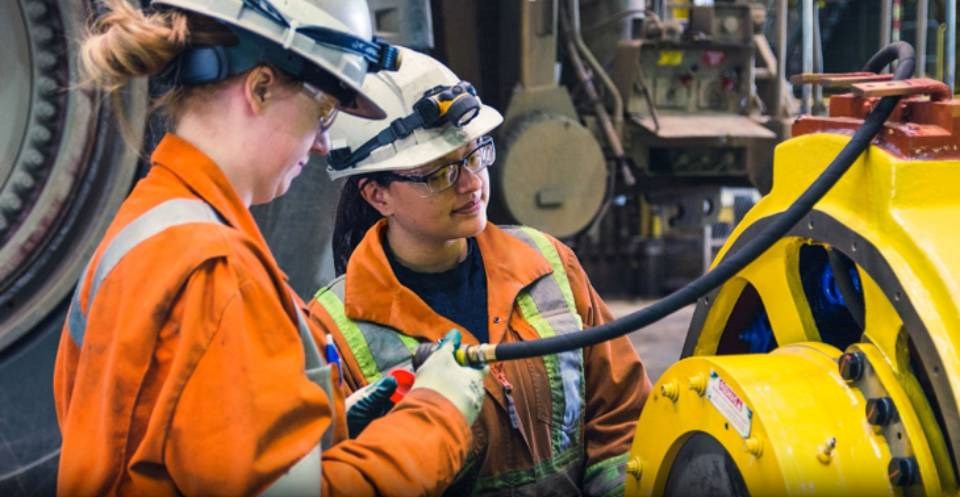Collège Boréal is offering a new training program designed to draw more youth, women, and newcomers to the mining industry.
The Mining Potential program, created and delivered in partnership with the Mining Industry Human Resources Council (MiHR), is a 14-week work readiness skilled training program being delivered at the college’s Sudbury and Timmins campuses.
Following a hybrid online and in-class format, the course is designed to give participants a solid foot in the door to eventually find work in the sector.
The first cohort is expected to get underway on Feb. 16.
Julie Nadeau, Collège Boréal’s director of business development, said the project is an effort to reach demographics that might normally face more barriers to entry in the sector.
“The main objective of the training program is targeted to women, youth and newcomers for the industry employers to enhance the potential for people to find employment in the mining industry,” Nadeau said.
The program comprises 165 hours of classroom training, which will be delivered both virtually and in person by industry experts, plus 120 hours of enrichment activities.
That will include mine site visits, hands-on activities, and presentations given by mining industry experts.
“We’re trying to make it very interactive,” Nadeau said. “There are breakout rooms, there are activities, and there are guest speakers throughout these courses.”
Students will also receive instruction in various training courses typically required in the industry, including WHMIS (Workplace Hazardous Materials Information System), CPR, service common core, lockout/tagout, confined space, and working at heights.
Among the industry partners that have signed up to participate, Newmont, which has gold operations in Timmins and north of Thunder Bay, has signed on as a corporate sponsor and will cover the program fees for 10 students.
Huron Mining, a Timmins-based mining contractor, will provide third-party common core training.
Timmins gold miner Lake Shore Gold, a subsidiary of Pan American Silver, will offer site visits and opportunities for students to hear guest speakers.
“Newmont Porcupine is pleased to support the Mining Potential program that is being launched through Collège Boréal and MiHR this month, supporting women, youth and newcomers in exploring the mining field," said Bryan Neeley, Newmont's manager of sustainability an external relations, in a news release.
"We rely on our qualified workforce to sustain the viability of our mines and it is crucial to have these types of programs to promote the various careers this sector can offer. We are a proud partner of Collège Boréal’s, as they are helping train tomorrow’s workforce.”
Upon completion, graduates will receive a certificate of completion from Boréal, as well as all their essential cards that indicate they’ve completed specific training.
“It gives them a really good base to come out and get employment into the mining industry,” Nadeau said.
To qualify for the Mining Potential program, participants must be at least 17 years of age, they have to have completed a Grade 8 level of education or the equivalent, and they must pass an English language proficiency test.
Boréal is capping registration at 15 students at each of the campuses.
Want to read more mining news from the North? Sign up for our newsletter.
This isn’t the first time the Sudbury-based college has partnered with MiHR to offer sector-specific programming.
The collaboration was also behind Boréal’s Mining Essential program, which is a pre-employment, work readiness initiative directed at Indigenous youth.
That program, which has been delivered multiple times over the years, boasts a 92 per cent completion rate, and more than 30 students have received their certificates of completion, Nadeau said.
“So with the success of that program, MiHR approached us again to ask if we wanted to do a pilot project and launch this new program, which is the Mining Potential program,” she said.
The program is being offered through Boréal’s corporate training and continuing education division, which provides most of its training in English in order to reach a wider audience, Nadeau said.
Funding for the program is being provided by the college and MiHR, which means enrolment fees are kept very low.
“The cost to the students is only $250, and with all their certificates and training it’s worth something over $1,000 of training,” Nadeau said. “So… these learners have an advantage to follow this.”
Boréal has busily been marketing the program to area school boards, the college’s newcomer division, several Indigenous communities, workforce planning boards, and chambers of commerce to spread the word.
As of early February, Nadeau said 10 participants had already signed up, a return rate Nadeau said she was “pleasantly happy” to see.
If the program takes off, Nadeau expects Boréal could offer the program three or four times a year.
Sudbury and Timmins were selected as the initial host communities for the program because their prominence in the industry and associated infrastructure fits well with the program’s goals.
But Nadeau believes the program could easily be expanded to other communities in the future.
“We need to have access to mine sites that are willing to allow some site visits, but it’s definitely not limited to those two,” she said.
“It’s just something we targetted as areas that are dominant in mining, so that’s why they were selected.”
The Drift features profiles on the people, companies and institutions making important contributions to Greater Sudbury’s mining sector. From exploration, operation and remediation to research and innovation, this series covers the breadth of mining-related expertise that was born out of one of the world’s richest mining camps and is now exported around the world.




